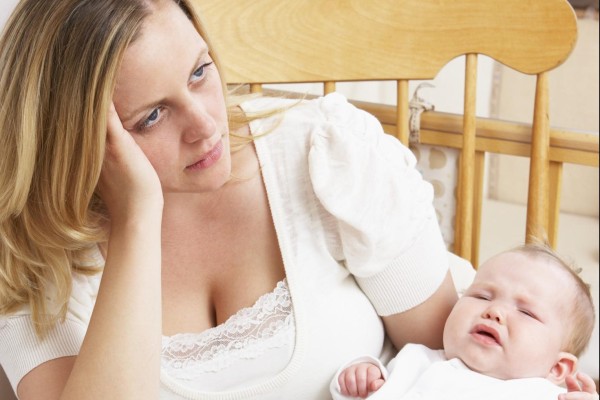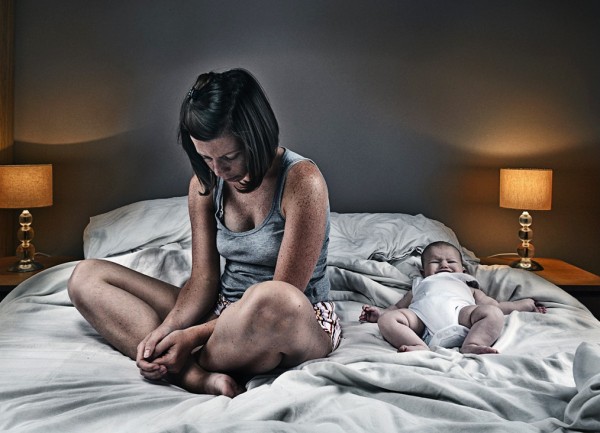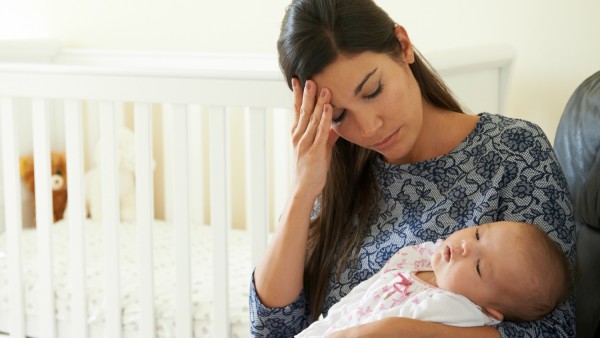Postpartum depression
The appearance of a new little man in the family is a holiday that all its members are eagerly awaiting. However, sometimes for a mother, changes in her life become unbearable and lead to the development of postpartum depression.
Content
Postpartum depression: causes
During the waiting period for the child, the female body is reorganized. To make it easier for a woman to endure this period of her life, hormones... They help her relate to life easier and make her more emotional. That is why pregnant women are often capricious, their mood and desires are rapidly changing. Everyone knows about this and is sympathetic to the behavior of expectant mothers.
 Why is there a depression after the birth of a child? Some psychologists are inclined to believe that a woman's body cannot quickly return to normal after childbirth and cope with the large number of hormones released during pregnancy. But most people think that this state of a woman is solely due to her temperament and character. After all, there are thousands of women who, after giving birth, are in a state of happiness, although many additional worries and responsibilities have fallen on their shoulders.
Why is there a depression after the birth of a child? Some psychologists are inclined to believe that a woman's body cannot quickly return to normal after childbirth and cope with the large number of hormones released during pregnancy. But most people think that this state of a woman is solely due to her temperament and character. After all, there are thousands of women who, after giving birth, are in a state of happiness, although many additional worries and responsibilities have fallen on their shoulders.
A young mother often experiences real stress. After all, her new responsibilities are incomparable with any, even the most difficult job. At any job, you can take a break or vacation, or simply quit if it becomes completely unbearable. Mom has no such opportunities. She must be with the child around the clock. Sometimes even in the toilet. In addition, after childbirth, any woman feels unwell and responsible for the child. This is what leads to the development of postpartum depression:
- Her expectations do not correspond to reality. Of course, during pregnancy, every woman understands that after the birth of a baby it will not be easy for her. But while expecting the first baby, women have no idea how hard it will be in reality. And when the realization of this fact comes, the woman experiences stress.
- Combining the duties of a mother and a hostess. Often, depressive state comes from the fact that a woman cannot adapt to the fact that now it is necessary not only to fulfill the duties of the mistress of the house, but also to take care of the child. The kid requires attention throughout the day: feeding, bathing, walking, changing clothes and much more. At the same time, you need to somehow have time to cook dinner, clean the apartment and wash ... How can all this be combined?
- Lack of sleep. Babies wake up very often in the first months of their life. Therefore, young mothers simply cannot gain strength due to constant lack of sleep.
- Feelings of helplessness. Many young women who become mothers for the first time do not know what and how to do, how to take care of a child. They are afraid to do something wrong and harm the baby.
How long does postpartum depression last?
Do not rush to consider postpartum depression a trifle and a whim of a newly-made mom. This is a very serious condition that needs to be corrected. Postpartum depression can continue in different ways. Often, instead of enjoying the happiness of motherhood, a woman falls into a sad state, which over time only gets worse and mommy feels more and more unhappy.
 It also happens that depression covers a woman a few months after giving birth. At first, a woman feels happy caring for her baby, but then discouragement and depression sets in.
It also happens that depression covers a woman a few months after giving birth. At first, a woman feels happy caring for her baby, but then discouragement and depression sets in.
The duration of depression depends on several factors. The main thing is the severity of the depressive state. With a mild form of the disease, the period lasts up to six months. If depression is complicated by psychosis, then it can last for more than a year.
An important role in the duration of depression is provided by the support of relatives and spouse, financial situation, the arrangement of life and the character of the mother herself. Sometimes the reluctance to seek help leads to the fact that the depression only intensifies.
Postpartum Depression Symptoms
Alarming signs of postpartum depression usually begin to appear almost immediately after the birth of a child, and over time they only get worse. Therefore, it is necessary to closely monitor the condition of the woman in order to show concern and participation in time and prevent the development of a depressive state.
In all women, the symptoms of a depressive state after childbirth manifest themselves in different ways. But still, there are some symptoms that are characteristic for each case:
- The woman shows no interest in her child. This symptom is the most frightening. A young mother does not want to take care of the child, feed him, sometimes even refuses to take him in her arms. The woman begins to experience negative feelings towards the baby.
- Fear of harming the child. A woman cannot cope with her helplessness, she is always afraid to do something wrong, harm her health or scare.
- The woman does not take care of herself.
- Suicidal thoughts begin to haunt her.
- Unwillingness to fulfill the duties of a mother and mistress of the house.
- Insomnia, weight problems. Moreover, a woman can either lose weight dramatically or gain weight quickly.
Postpartum depression: what to do
After being discharged from the hospital, the woman is left alone with the child and a bunch of conflicting information about how to feed the baby, how to take care of him. Grandparents visit mother and child from time to time, often just to look at the child, and not to provide the mother with real help. The spouse spends whole days at work and also does not help much.
And the image of a happy young mother with a smiling happy baby that has developed in modern society only adds to the experience. The woman realizes that she does not fit into the standard framework and begins to think that she is a bad mother. As the child grows up, new reasons for experiencing are added.
In order not to get depressed, try to follow these recommendations:
- Try to improve your sleep. For your baby to sleep well at night, you need it before bed. redeem... In addition, he should feel comfortable - no wet diapers and no feeling of hunger. Healthy sleep of the child at night is a guarantee of your good rest. If your baby is practically does not sleep all night then do not despair. A little time will pass, and he will again get tired and fall asleep. Do not rush to do household chores at this time, go to bed. If you fail to rest again, wait for the next rest of the baby and sleep again. Do this until you get a good night's sleep.
- Streamline your household chores. Do not strive to be an exemplary hostess. For example, do not iron things that can be left unironed - towels, bed linen, etc. You don't need to do a cleaning every day. Do the parents want to look at the baby? Put the baby in the stroller and send the grandmothers for a walk with him. You will have time for rest or household chores, and grandmothers will look after the child and take a walk with him. In addition, do not rush to refuse the help that is offered to you, and do not hesitate to ask for help if you need it.
- Establish a daily routine for your child. This will give you the opportunity after feeding to snatch a couple of hours for yourself, leaving the baby in the care of dad or relatives for this time. During this time, you will be able to walk or put yourself in order.
- Plan your time. Make a to-do list for the day, categorizing them according to their importance. During the day, try to get everything done. But don't over-think. After all, it is impossible to do everything with a child. Try to do the necessary things while your baby is relaxing.
- Keep track of your food... Often women, fearing to harm the baby, set too strict a diet for themselves. This can lead to depression. Talk to your doctor and decide together which foods are right for you. Prepare quick meals. If possible, buy yourself appliances that simplify the cooking process - a multicooker, an electric meat grinder, a blender, and so on.
- Chat with other new moms. Communication with women like you will give you the opportunity to understand that other people experience the same difficulties as you. You are not alone, and you are not a terrible mother. Everything that happens to you is quite normal, you have nothing to reproach yourself for. Don't try to be the perfect mom, just have fun with life and your baby.
Postpartum depression: treatment
If you do not have the strength to get out of postpartum depression on your own or the condition is already such that it is almost impossible to do this, then you will need the help of specialists, and possibly drug treatment. Basically, medications from the group of antidepressants are used to eliminate postpartum depression.
 Of course, it is undesirable for a nursing mother to take any medications. But here you need to weigh everything and evaluate the harm from taking pills and harm to the child from the protracted serious condition of the mother. In severe forms, depression will not disappear by itself, it is imperative to use drugs here. If not taken, then the mother's condition will cause much more harm to the child than taking antidepressants. As a last resort, you can always abandon breastfeeding in favor of artificial. But keep in mind that the latest generation of antidepressants do not pass into breast milk. In this regard, they can be used to eliminate depression, even for lactating women.
Of course, it is undesirable for a nursing mother to take any medications. But here you need to weigh everything and evaluate the harm from taking pills and harm to the child from the protracted serious condition of the mother. In severe forms, depression will not disappear by itself, it is imperative to use drugs here. If not taken, then the mother's condition will cause much more harm to the child than taking antidepressants. As a last resort, you can always abandon breastfeeding in favor of artificial. But keep in mind that the latest generation of antidepressants do not pass into breast milk. In this regard, they can be used to eliminate depression, even for lactating women.
In addition to antidepressants, hormone therapy is recommended to eliminate postpartum depression. Such treatment gradually eliminates its manifestations. Hormone therapy is also recommended to prevent the development of postpartum depression.
In conjunction with treatment with medications, specialists prescribe psychotherapy. Usually, in this case, elements of interpersonal therapy are used, which corrects problems in an already established family. During the session, the psychotherapist finds out the causes of the depressive state and the moments that provoked it. A woman looks at things differently and learns to solve problems.
Sometimes it is necessary to participate in psychotherapy sessions with other family members. This will help to uncover problems within the family and learn how to solve them. It is difficult to say how many sessions will be needed to successfully solve the problem. The average number is up to 20. Of course, it is difficult for a young mother to find time to visit a psychologist, but it is necessary to do this in order to successfully cope with the disease.




